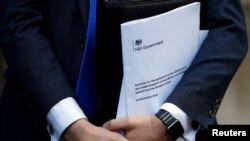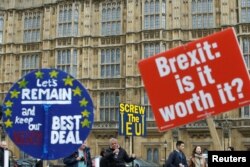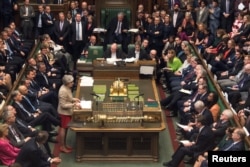Britain’s governing Conservative Party faces an historic loss in next month’s European Parliament elections, warn party insiders and pollsters, as a result of its handling of Brexit and the delay of the country’s departure from the European Union.
Half-a-dozen opinion polls suggests the Conservative government of Prime Minister Theresa May could fall off a cliff and the center of British politics could be eroded, benefiting a new Brexit party founded in January by populist Nigel Farage and the Labour Party, which, under the leadership of socialist Jeremy Corbyn, has moved significantly to the left.
“Populist parties are resurgent, politics is re-fragmenting, trust has all but vanished and left, center and right are in a rage. The atmosphere is surly, nasty and vicious,” according to Allister Heath, a commentator.
Few voters expected
Some opinion polls are forecasting Conservative candidates in the May elections for the European Parliament will attract only 15 percent of the vote, which, if accurate, would be the party’s worst electoral performance ever. The forecasts suggest Farage’s Brexit party, which wants an immediate clean break with the European Union, regardless of the economic or political consequences for Britain, including Scotland opting for independence, will top the election.
The Labour Party likely will come in a close second, thanks mainly to pro-Remain voters, who want Britain to stay in the European Union, the pollsters say.
The polls bring home how Brexit is reshaping British politics and setting the country up for a major realignment not seen since the 1920s and the rise of the Labour Party. The likely biggest casualty of the political shift will be the Conservatives, also known as Tories, party insiders admit.
Opposite camps
Voters now identify more strongly with either the Leave or Remain camps than they do with Britain’s parties, in a division that’s falling more along socio-cultural lines than traditional socio-economic ones.
When it comes to a possible general election in Britain, which many politicians expect to happen this year, polling data suggests that just half of the Conservative Party’s lifelong voters would back it.
A quarter say they will switch their vote to Farage’s group or his old UK Independence Party, setting up the likelihood of Labour emerging as the largest parliamentary party and reliant on the support to govern of Scottish Nationalists, Liberal Democrats and a breakaway pro-Remain party called Change UK, made up of Labour and centrist Conservative defectors.
Until this month it was unthinkable that Britain would have to take part in European elections. The country was due to leave the bloc on March 29, but now has a new departure date of October 31.
But deadlock in the British parliament, where lawmakers refused to approve an exit deal negotiated by Prime Minister May with the European Union and also have not been prepared to leave the bloc without a deal, forced the exit delay. EU leaders had no option under the bloc’s rules but to demand Britain participate in the elections for as long as it remains a member.
Political system in crisis
The Euro-elections couldn’t have come at a worse time for a British political system that’s cracking and creaking under the strain of an ill-tempered Brexit, which has seen Leavers demanding a sharp break with the Continent and pro-Europeans trying to salvage a so-called soft Brexit.
May is holding talks with Labour in an attempt to secure a compromise exit deal involving a deeper, permanent customs deal with the European Union, a move that’s infuriating hardline Brexiters in her party.
Dozens of local party chairmen and hundreds of grassroots activists the party relies on for campaigning have said they will shun the elections and offer no help. The Conservative Party is also running out of money with big donors on both sides of the Remain and Leave debate, withholding their normal funding.
“Many long-standing Tories are on strike,” says Daniel Hannan, a Brexiter and Conservative European Parliament lawmaker. Writing in Britain’s Sunday Times newspaper, Hannan raised the prospect of a complete Conservative meltdown next month.
“There comes a point when a political party gets so badly hammered at a national poll that its position becomes irrecoverable. It happened to the Canadian Tories in 1993. It could happen to the British Tories next month,” he warned.









